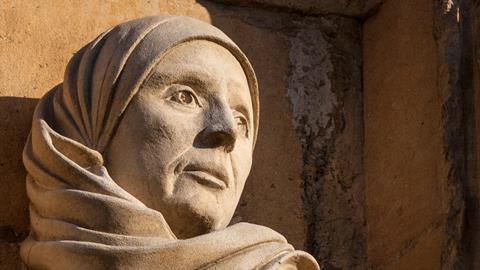Dr Belle Tindall looks at the groundbreaking life of the first female English-language author
I have recently fallen head over heels in love with someone.
The thing is, that someone died in the 15th century. I also don’t know that someone’s actual name, nor much else about them, to be honest. And yet, I know enough to be bowled over, enough to still be talking about them centuries later. I know that they’re wise and weird, mysterious and medieval, spiritual and secretive.
The someone is Julian of Norwich.
I have been reading her (yes, ‘her’) work for the past few months and I am hooked on this mystic powerhouse. And seen as her infamous book is entitled Revelations of Divine Love and it’s February, the month of luuuurrrrrve, what better time to take my gush-a-thon public?
What we know about Julian
So, let’s start with who she was, and then we can move into why she’s a spiritual force of nature and a Christian-feminist icon. Firstly, her name probably wasn’t Julian at all. We don’t know her name. She was incredibly firm that people pay her very little attention (whoops, sorry Julian) – wanting her work to point away from her and toward the God she loved so deeply.
Nevertheless, here are the very few pieces of the puzzle that we do have.
We think she was born in 1342 and lived a completely run-of-the-mill life, until, at the age of 30, she fell incredibly ill. So ill, in fact, that she received her last rites and had her eyes closed by her mother who, at one point, presumed her dead. While she was in this dizzyingly ill state, she had 16 incredibly vivid visions of God and Jesus. Oh, and then she was completely healed of her illness. Fascinating, right?
Julian thought so, too.
So captivated was she, both by these visions and by the God she was certain had sent them to her, that she became an anchoress. This means that she spent the rest of her life in a cell built onto the side of St Julian of Norwich Church (hence the name we use for her). She was literally bricked into this room; it makes me hyperventilate to think about it. Her only access to the outside world was through three windows: one, facing the high altar of the church. This meant that she could see into church, and participate in worship, without being seen. The second window was the one through which she would be cared for, with provisions passed through. And the third faced out into Norwich city. You see, this eccentric mystic had quite the reputation – people would come to her, from far and wide, for counsel and prayer. What a woman.
Mostly, though, she was alone. And that was just how she wanted it. To quote Claire Gilbert, who wrote the historical novel, I, Julian (Hodder & Stoughton): “She could ask the world to recede, and it would.” She desired quiet, solitude, freedom and endless time. Living to an old age, Julian used this time alone to ponder, again and again, the visions she had had. She asked God, endlessly, to tell her what they meant. She turned them over and over in her mind, praying them through continuously.
And then, she wrote them down. Her visions and ponderings are now a book that we call Revelations of Divine Love. And, my gosh, it’s quite something. Her visions, and her explanations of them, are undeniably weird but she was resolute on one thing – that they’re all about love. We are loved more than we could ever hope to fathom; of that much, she was sure. In her final vision, God said to her: “Do you want to know what your Lord meant? Know well that love was what he meant. Who showed you this? Love. What did he show? Love. Why did he show it to you? For love.”
How beautiful is that?
It was that love that gave Julian the confidence to pen her most famous line: “All shall be well, all shall be well, and all manner of things shall be well.”
Honestly. It makes me want to weep.
Breaking new ground
And here’s the kicker, reason number 758,389,826 to love Julian of Norwich: Revelations of Divine Love was the first book to be written by a woman in the English language. Female mystics weren’t totally uncommon in Julian’s time, and women’s spiritual experiences and insights were being taken increasingly seriously – but, still, what Julian created was groundbreaking. Dangerous, even. Because Julian was unapologetically feminine in the way she wrote about God, sensing him as a ‘mother’, even.
She didn’t do this to make a point, to earn a Christian-feminist badge of honour. She was just unafraid of herself, unafraid of taking on a monumental, never-before-done, task – and doing so as a woman. I don’t sense that she felt any kind of need to shy away from her female identity – she decided to be something that she had yet to see.
Honestly, when I say I love her, I really mean it. But, more importantly, her writing is guiding me by the hand as I wade, ever deeper, into loving the God she knew so well.

































No comments yet